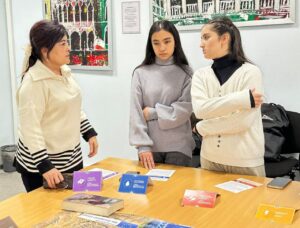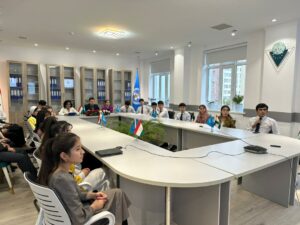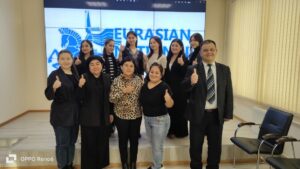In Central Asia, science and education in the region has been hindered by a lack of cooperation among universities, a situation that has similarly influenced multi-country solution building in water management and environmental protection.
To address these needs, USAID Central Asia’s Regional Water and Vulnerable Environment Activity and the Regional Environmental Centre for Central Asia (CAREC) teamed up to support the Network of Academic Societies (NAS) and an online Community of Practice where regional water specialists, academics and students can share ideas and build professional relationships.
NAS formed in 2012, established by CAREC with support from the EU, World Bank, USAID, and other donors to unite universities and research centers in the region. Bi-annual meetings of NAS provide opportunity for academic institutions to find potential collaboration.

Photo 1. Guest lecture at APA under the President of the Republic of Tajikistan
One example is a guest lecture delivered by L.N. Gumilyov Eurasian National University (ENU) to students and faculty at the Academy of Public Administration under the President of the Republic of Tajikistan (APA) in May 2023. Then, in the autumn-winter semester later that year, nine APA students went to ENU on a study exchange for classes in international law, international relations, and regional studies. Another cohort of APA students will study at ENU in spring 2024.

Photo 2. Students of APA under the President of the Republic of Tajikistan during the Nexus Game process at the L.N. Gumilyov ENU
“Our students received an excellent opportunity to gain experience in Kazakhstan. This is a clear example of how we, the universities of Central Asia, can successfully interact and generate mutual benefits for both sides, because science is developing thanks to openness and communication,” said Alisher Saidmukhtorov, Head of the Department of International Law, APA under the President of the Republic of Tajikistan.
In November 2023, ENU, APA and Ferghana State University met online to share their respective experiences in teaching and supervising graduate students in water diplomacy. From this experience, APA announced plans to advise doctoral students on this topic in the future.


Photo 3. Participants of the teleconference between the universities on November 8, 2023 (on the left – APA under the President of the Republic of Tajikistan, on the right – L.N. Gumilyov ENU)
“It is the academic community that can give impetus to solving the water issue and strengthening transboundary water cooperation in the region in terms of science. Therefore, it is important to interact and cooperate within this network and strive to find a common solution for all,” said Aigerim Ospanova, PhD, Professor, Head of the Department of Regional Studies, Faculty of International Relations, L.N. Gumilev ENU.
At the moment ENU and APA are striving to develop scientific cooperation, which include plans for doctoral thesis advising, joint scientific projects and events, guest lectures, etc. Representatives of the universities are in close contact through the NAS meetings where they regularly report on their joint activities.
“Our cooperation was made possible thanks to the efforts of the USAID Central Asia’s Regional Water and Vulnerable Environment Activity, CAREC and the Swiss Agency for Development and Cooperation (SDC). It was the NAS meetings that became the platform where we can exchange experiences and contacts for subsequent meetings,” said Ospanova.
Thus, the NAS and the Community of Practice of Central Asia have become the platform that helps to develop cooperation between universities at the regional level. Now the USAID Regional Water Vulnerable Environment Activity, together with the Regional Environmental Centre for Central Asia, are ready to further develop this platform and urge all universities in the region to join.
Aigerim Ospanova and Alisher Saidmukhtorov’s video interview:
Additional information: Ludmila Kiktenko, Environmental Management Programme’s Manager, CAREC, lkiktenko@carececo.org

